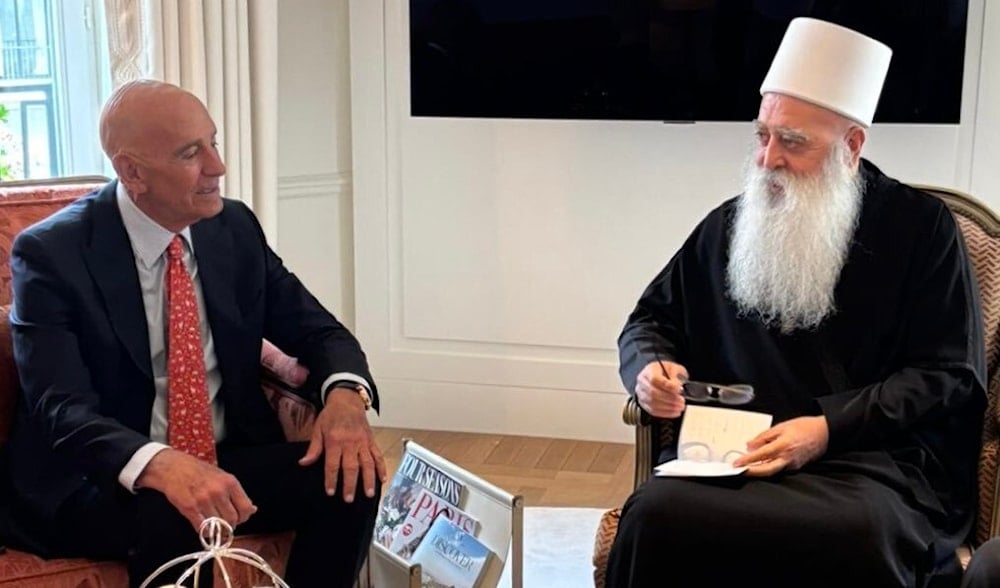Sheikh Tarif declined meeting with al-Shaibani, Dermer, Barrack
Druze leader Sheikh Tarif has rejected a US offer to attend a trilateral Syria-"Israel"-US meeting as the US pushes talks on the Sweida crisis, Golan Heights, and 1974 disengagement deal.
-

US Envoy to Syria Tom Barrack in a meeting with the Druze Spiritual leader Sheikh Muwaffaq Tarif, August 19, 2025 (X/ @USAMBTurkiye)
Sheikh Muwaffaq Tarif, the spiritual leader of the Druze community in the occupied Palestinian territories, declined to join a trilateral meeting comprising Israeli Minister of Strategic Affairs Ron Dermer, Syrian Foreign Minister Asaad al-Shaibani, and US Envoy to the US Thomas Barrack, Israeli media reported.
A source familiar with the matter revealed to Israeli broadcaster Makan that US envoy Barrack had invited Tarif to join the trilateral meeting, but the latter declined the offer, preferring instead to hold a separate one-on-one discussion with US envoy Tom Barrack.
The report added that during the visit, videos were shown to the US envoy for the first time, allegedly implicating Syrian security forces in the Sweida massacres against the Druze. It stated that the visit's goal was to pressure Syrian authorities to improve the dire humanitarian situation and lift the security blockade on the city.
Damascus reaches out to Tarif
The report also stated that Damascus had repeatedly tried to engage Tarif in recent months because of his influence in Sweida, revealing that the Paris talks centered on two main issues: the Druze community and a potential Israeli-Syrian security deal, with both sides aiming to revise the 1974 disengagement accord to include provisions for the Druze.
Meanwhile, Damascus has denied reports of an agreement being signed between Syria and "Israel" on September 25, with the participation of US President Donald Trump.
The report suggested, however, that these rumors likely have some basis, in fact, pointing to intense US efforts to mediate the key point of contention, the Israeli "military presence" in the Golan Heights and southern Syria, while also stressing that a comprehensive normalization deal between the two is not currently under discussion.
United Nations envoy warns of fragile Sweida ceasefire
This comes as the United Nations warned of the shaky ceasefire in Syria's Sweida region, cautioning that renewed clashes and massacres could break out and remain a very real possibility.
"In Sweida, the ceasefire agreed on 19 July has come under strain, but, so far, has prevented a slide back into open conflict… That said, we are still seeing dangerous hostilities and skirmishes on the margins of Sweida, and violence could resume at any moment," UN Special Envoy for Syria Geir Pedersen said in a UN Security Council briefing on August 21st.
"The absence of stronger commitments and mutual trust continues to undermine the ceasefire’s stability," Pedersen added.
The ceasefire followed some of the bloodiest violence in years, when armed groups backed by Damascus, including Bedouin militias aligned with the state and elements of pro-government security forces, carried out attacks on Druze villages. Local Druze defense units resisted, sparking heavy battles that forced Damascus to send additional forces to the province on July 15.
The death toll remains contested. According to Syria TV, 558 people were killed, 783 were wounded, and more than 2,000 families fled to Daraa, while the Syrian Observatory for Human Rights placed the number at over 1,000 dead. Local monitors accuse pro-Damascus factions of direct involvement in the massacres, compounding Druze mistrust of the central state.

 3 Min Read
3 Min Read










